This is a PSA to Companies and Sales Leaders on the importance of providing psychological safety.
It’s impossible for salespeople to perform their best if they don’t “feel safe”.
In this post we’re going to explore what you need to know about psychological safety and it’s impact on Mental Health and sales performance.
Why Is Psychological Safety Is Important In Sales?
Before diving into psychological safety within sales, it’s important for us to have a general understanding of how our mind and body respond to danger.
According to Porges Theory and outlined by Bessel van der Kolk in his amazing book The Body Keeps The Score, he talks about how humans respond to threats and stressors in three different phases. This is relevant because salespeople face constant daily stressors that impact their Mental Health.
Phase 1 – They Call Out For Help.
Humans are wired to be social beings because cooperation and collaboration with others has been critical to our safety and survival as a species for thousands of years.
This means when we first encounter a threat or stressful situation, our facial expressions will naturally show distress which signals to others that we need help. More importantly however, is our first instinct will be to call out for help from others.
Phase 2 – Fight or Flight
If no one responds to our expressions of distress or our calls for help, we’ll start to feel unsafe and alone. Our body will then move into phase two and engage our fight or flight system.
When this system activates, we start to experience things like faster breathing, increased heart rates and our body will start releasing adrenaline and cortisol to help prepare our body to fight or run from the threat in front of us.
Most of the time we won’t even be consciously aware of this system activating during the work day; primarily because we’ll be so distracted with the work in front of us. Generally we describe these physical changes that we experience as “feeling anxious” or “stressed”.
This system also makes us highly emotional and reactive. The part of the brain responsible for our emotions powers UP and the part of our brain responsible for logic and creativity powers DOWN.
It becomes literally impossible to sell and perform our best at work.
Phase 3 – Freeze/ Collapse
Finally – in extreme cases of danger, that are unlikely to exist in the workplace (I hope), the last stage is phase three. In situations where we’re unable to fight or can’t get away because we feel trapped; everything in our body will start to shut down.
Our heart rate and breathing may drop rapidly causing us to faint and/or our digestion system will stop working and empty (aka scaring the sh*t out us). We’ll also start to become numb to the world around us.
Unpleasant consequences of being extremely afraid and unable to cope with the danger we’re facing.
Sales Leader Take Away
Sales leaders your main takeaway here is you need to be hyper aware of the interdependency between phases. You need to create a psychologically safe environment that reduces the amount of time team members spend in Phase Two.
Simple actions leaders can take like making themselves more approachable or making it easy for reps to ask for help are often overlooked. Basic safety needs that are neglected in sales, which erode Mental Health and sales performance over time.
You may be thinking…
Those wishy-washy things don’t matter that much…
But I assure you they do – so let’s take a closer look at some recent data.
Enjoying This Post? Learn How to Thrive Under Pressure and Hit President’s Club
What’s The Impact Of Psychological Safety?
The failure to provide psychological safe environments and it’s impact on Mental Health in sales is enormous.
The Sales Health Alliance recently partnered with UNCrushed and The Harris Consulting Group on a survey that collected data on several variables contributing to psychological safety. We gathered responses from 770 salespeople to find out how vulnerability, supportive leadership, connection to others and job security impacted Mental Health and sales performance.
Across all four variables there was a strong positive correlation. Though we cannot claim “causation” we can strongly suggest that improving psychological safety in these areas will improve Mental Health and sales performance.
Impact of Supportive Leadership on Mental Health
The relationship between leader and employee is the most important bond that gets formed in any workplace. Countless data points and studies have confirmed that the strength of this relationship has a direct impact on employee engagement, productivity and well-being.
Data from the survey mentioned above showed similar results. Among salespeople who “Strongly Agreed” that they felt supported by their leader; 68% rated their Mental Health as Good, Very Good or Excellent. When salespeople “Strongly Disagreed” they felt supported by their leader; only 15% rated their Mental Health as Good, Very Good or Excellent.
This means salespeople are 4.5X more likely to rate their Mental Health as Good or better when they feel strongly supported by their Leader.
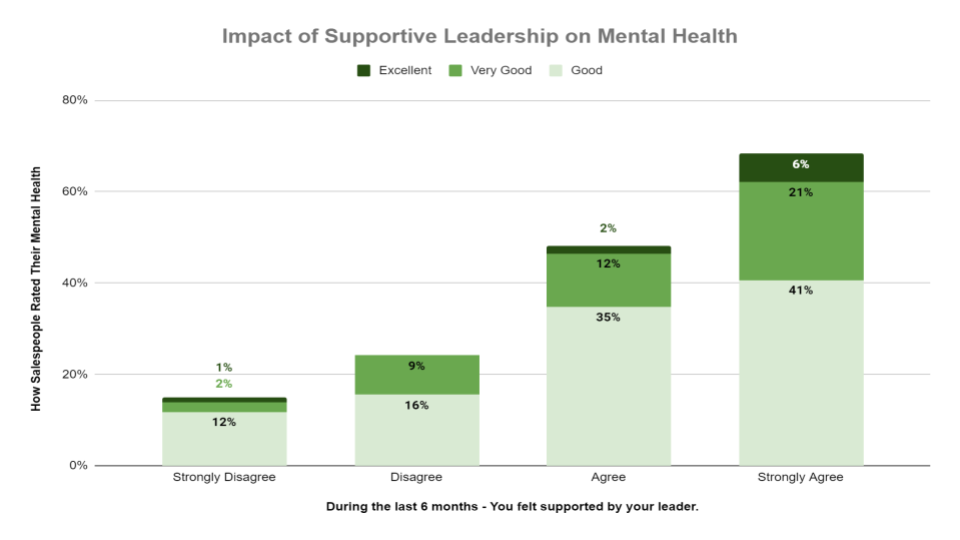
Impact of Supportive Leadership on Sales Performance
Though less impactful overall, supportive leadership also correlated with better sales performance.
Among salespeople who felt strongly supported by their leader; 87% rated their sales performance as Good or better. This was 28% higher than salespeople who felt strongly unsupported by their leader. In the graph below, you can also see the percentage of salespeople who rated their sales performance as Very Good or Excellent, steadily increases with more leader support.
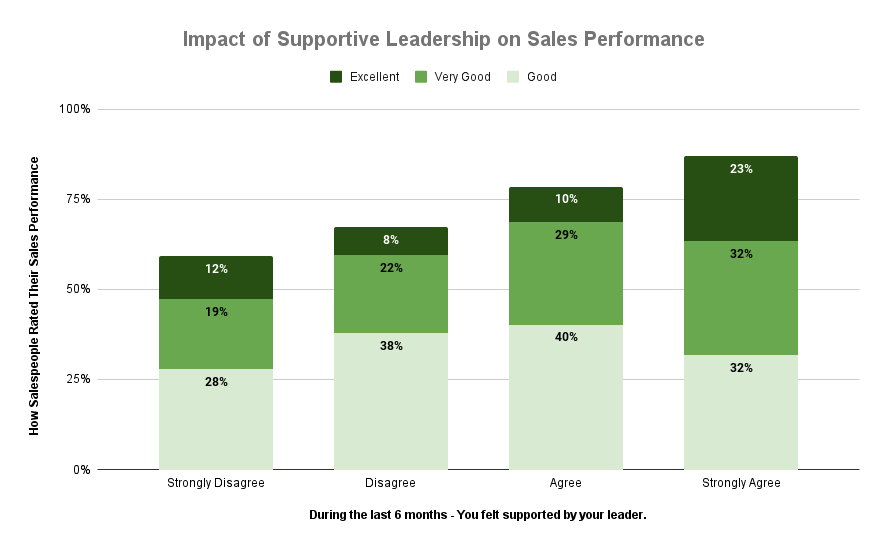
Supportive Leadership Take Away
“Supportive Leadership” can mean different things to different people. Regardless of your definition, being a supportive leader means providing three primary things to your team:
- Make it easy for your sales reps to ask for help.
- Make it “OK” and safe for your sales reps to make mistakes and fail.
- You need to make yourself available as a leader.
When I posted about psychological safety recently on LinkedIn, Melissa Meyer who is a forward thinking sales leader, summarized the first two areas perfectly:
“For me at work, it comes down to having the “freedom to fail” or make a mistake and receive the support or comradery to know when, where, and how to ask for help.
I’ve worked in terrible environments where asking for help was seen as weakness and bad managers or unscrupulous coworkers used others’ mistakes as a way to move themselves up in the pecking order.
Thank you for bringing up this topic and elevating the need to a foundation of trust and respect at work.”
As Melissa states – leaders can make it easier for team members to ask for help by providing clear guidelines on how, when and where to do so.
Amy Volas, Founder of Avenue Talent Partners, also contributed to the discussion by sharing this amazing visual below. It shows the massive impact fear of failure can have on Psychological Safety and culture when leaders don’t make it safe for reps to make mistakes.
Enjoying This Post? Learn How to Thrive Under Pressure and Hit President’s Club
Psychological Danger VS Psychological Safety
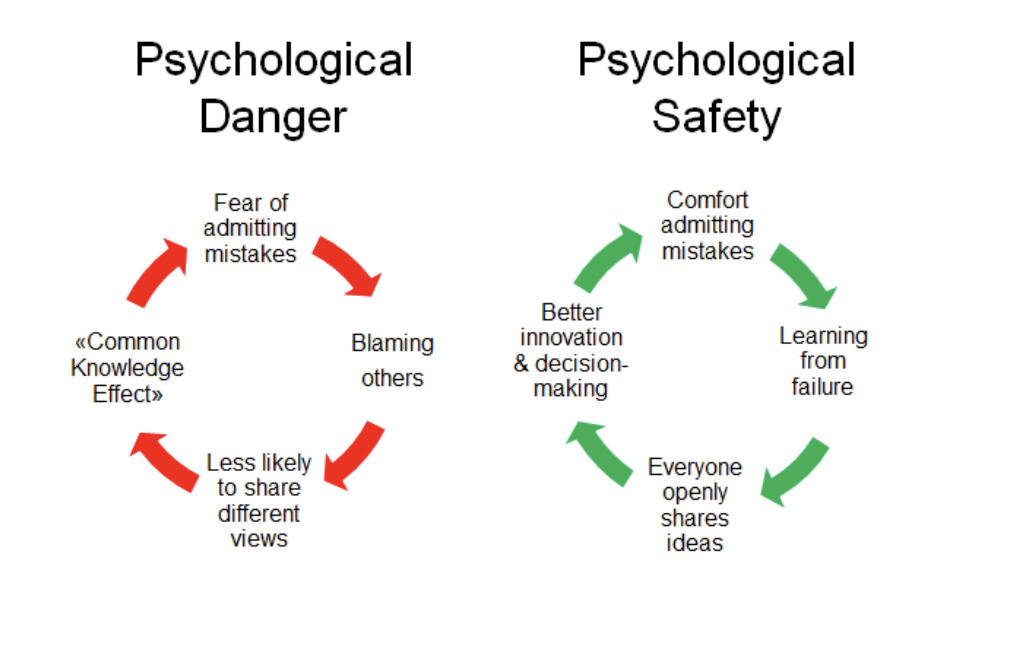
Far too often Sales Leaders are chasing perfection from their team. There is nothing wrong with setting high expectations and holding reps accountable; but expecting them to be perfect is a fool’s errand that does more harm than good.
Failure and making mistakes is a part of working in sales and being human. When leaders learn to embrace and value the lessons taught by failure, they create a more supportive environment where trust and innovation can flourish.
Lastly, leaders need to be available to their team. As we learned at the start of this post, our first instinct is to ask for help when we don’t feel safe tackling a stressful situation. If no one is available or no one responds to our calls for help, then our stress response will engage.
In a remote working environment, making yourself available when your team needs you can be challenging for a leader. My recommendation is for leaders to time block “open office hours” each day.
To do this – simply create an open Zoom or Conference link that people can drop into at a set time each day. Inform your team that this is the time to ask questions, vent and connect when they need it. If no one shows up; then you can use this time to complete admin tasks while a conference room is left open.
Impact of Vulnerability on Mental Health in Sales
So you’ve informed your team how, when and where to ask for help. You’ve made it safe for them to make mistakes. And you’ve made yourself available each day to support your team.
But still – all your conversations with reps are surface level, no one asks for help and you can tell your team is harboring uncomfortable emotions.
Well this is likely an issue with approachability and trust.
If you’re not approachable and your team doesn’t trust you, then it’s unlikely they’ll ask for help. This is why becoming more vulnerable as a leader becomes so important to providing psychological safety. It makes you safer to approach and easier to trust when reps on your team are struggling.
In the survey data, we saw a very strong positive correlation between increasing vulnerability and better Mental Health. Among salespeople who “Strongly Agreed” that they could be open and vulnerable with how they were feeling at work; 69% rated their Mental Health as Good, Very Good or Excellent.
This was almost 4X higher than salespeople who felt unsafe being vulnerable. Among salespeople who “Strongly Disagreed” they could be vulnerable at work; only 18% rated their Mental Health as Good or better.
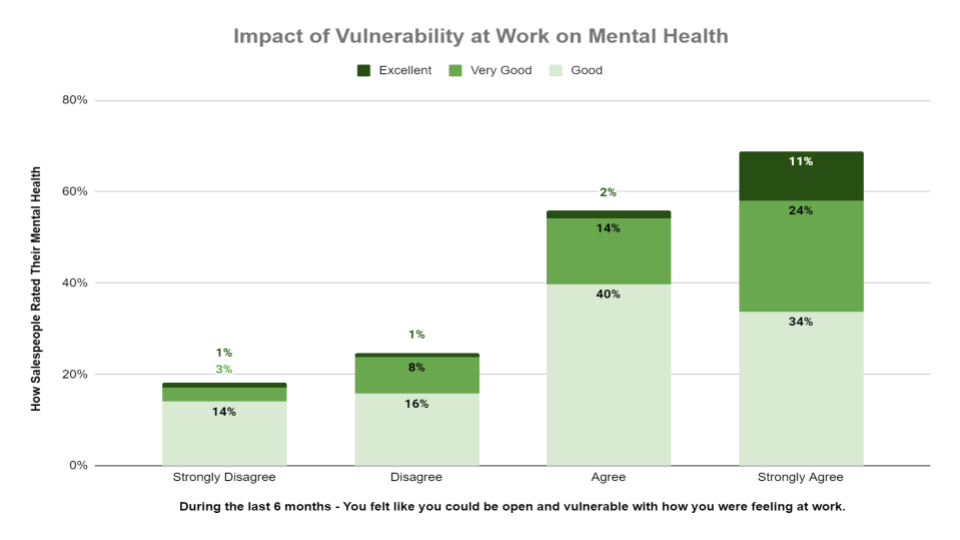
Impact of Vulnerability on Sales Performance
Increased vulnerability in the workplace was also correlated with better sales performance. Not only did overall sales performance improve with increased vulnerability, but the percentage of salespeople who rated their sales performance the highest more than tripled.
We found that among salespeople who felt most comfortable being vulnerable with how they were feeling at work; 31% rated their sales performance as Excellent. This was 3X higher than salespeople who felt uncomfortable being vulnerable, where only 10% rated their sales performance as Excellent.
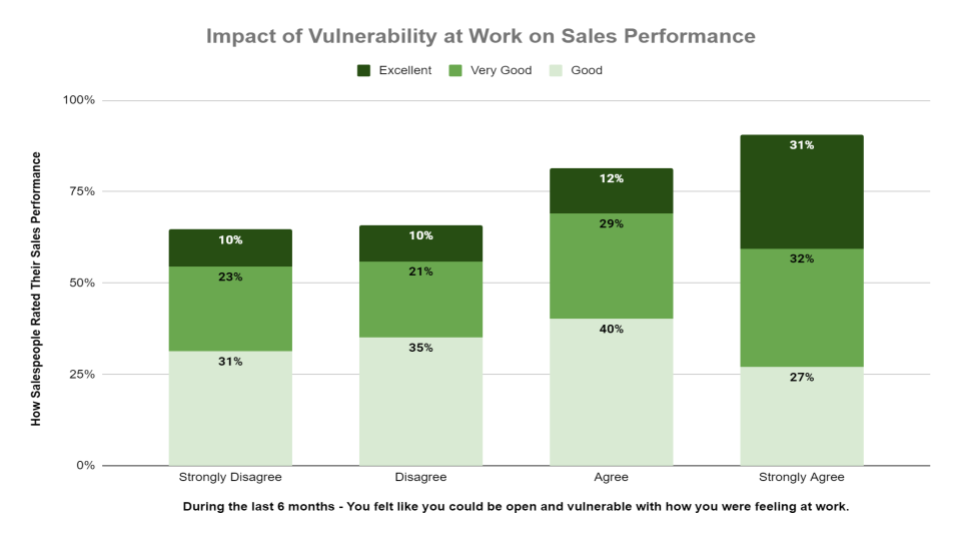
Vulnerability Take Away
As a leader who likely cares about your teams Mental Health and sales performance, your team would benefit from more vulnerability. To do this you need to address the Vulnerability Paradox within sales. This paradox can be understood by asking one simple question:
How likely are you to be vulnerable with someone who is judging your performance on a task?
The answer = Very Unlikely.
Sales leaders – YOU are the ones judging your sales reps’ performance. Simply telling them to be more vulnerable or to “open up” will not work. You as the leader must go first. It’s a misconception many leaders have that they must present themselves as “perfect”, ” “fearless” or “infallible”. When leaders do this they strengthen the effects of the Vulnerability Paradox.
In a situation where someone is being evaluated or judged; they will only feel comfortable being vulnerable when they know their evaluator or judge will be compassionate and empathetic to what they’re feeling.
Sales reps want to know that they’re sales leaders “get it”.
When a sales rep is wrestling with anxiety, embarrassment, trouble sleeping, relationship turmoil or a deal they just lost; they need to feel safe knowing they won’t be judged for opening up and perceived as “weak”. They need to trust their leader will understand what they are feeling and support them.
The only way they will feel this trust is when leaders share first.
Leaders need be consistent and open with their emotions on a regular basis. Develop your Emotional Literacy so you can accurately describe how you’re feeling to your team. Open up about your own Mental Health journey and share stories about when you struggled or faced challenges in sales.
After 2.5 years of leading conversations about Mental Health in sales, one thing remains abundantly clear:
Anxiety in Sales is not optional. It’s part of everyday life. I’ve yet to meet a leader or rep who hasn’t struggled at some point during their career, which means you likely have something to share.
Injecting more vulnerability into a sales culture requires leaders to lead by example. In doing so they become more approachable, easier to trust and make it safer for reps to ask for help.
Enjoying This Post? Learn How to Thrive Under Pressure and Hit President’s Club
Importance of Job Security on Psychological Safety
Even if you’re a supportive leader who is trusting and approachable, sometimes the sales environment will simply get the best of the sales reps on your team. Stressors will unconsciously pile up and declining Mental Health can cause reps to lose perspective very quickly.
A string of bad deals falling through, dealing with an angry customer, followed by missing target; and it doesn’t take much for a rep to start feeling unsafe in their environment. As their Fight or Flight system starts ramping up, it’s not long before anxiety and intrusive thoughts have a rep second guessing their job security.
This has a dramatic impact on Mental Health when a sales rep starts thinking: “What if I get fired or what if I lose my job?”
Impact of Job Security on Mental Health in Sales
Our data showed that among salespeople who “Strongly Disagreed” they felt job security in their role; only 11% of salespeople rated their Mental Health as Good or Very Good. Zero percent of salespeople rated their Mental Health as Excellent.
On the other hand, among salespeople who “Strongly Agreed” their role was safe and experienced job security; 74% of salespeople rated their Mental Health as Good, Very Good or Excellent.
This means salespeople who feel strongly secure in their jobs are 6.5X more likely to rate their Mental Health as Good or better; compared to those who feel most at risk of losing their job.
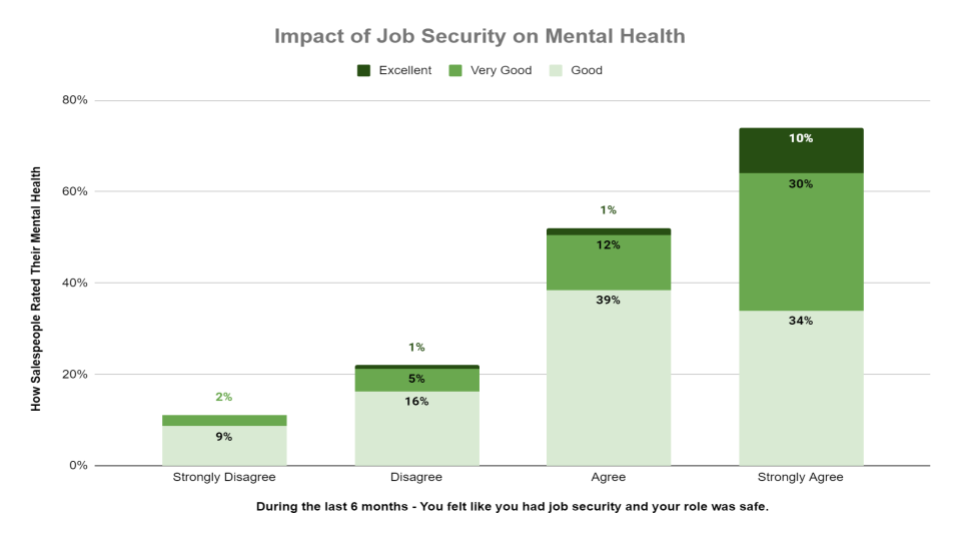
Impact of Job Security on Sales Performance
There was also a strong positive correlation between job security and sales performance. This means the more secure and safe a salesperson felt in their role, the higher they rated their sales performance. This was especially true for peak sales performance.
To the Sales Leaders reading this post right now – are you ready for this?
Among salespeople who “Strongly Agreed” that they had job security and their role was safe; 96% rated their sales performance as Good or better. Within this group, 41% of salespeople rated their sales performance as Excellent!
Imagine how much less stressful your day to day would be as a leader if almost 100% of the reps on your team were performing well?
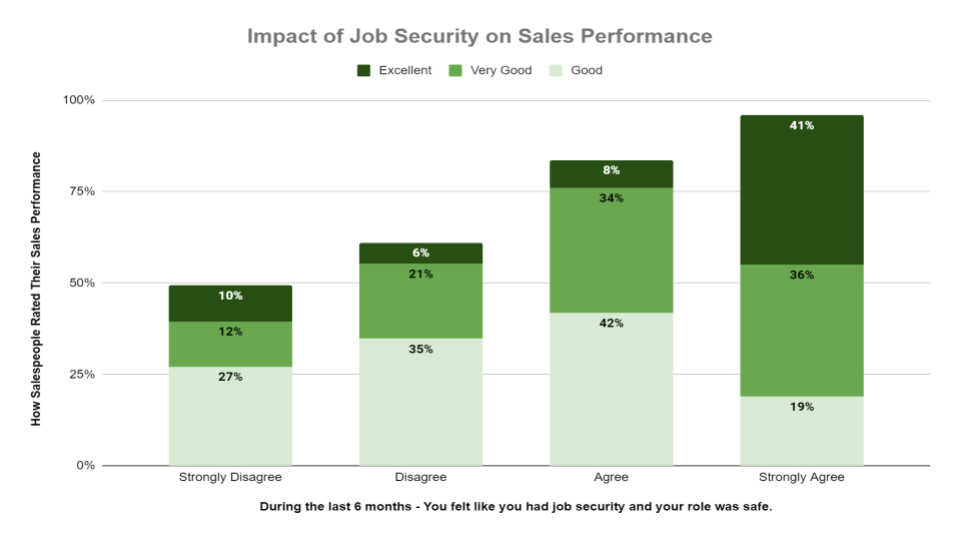
Why Job Security Impacts Psychological Safety SO Much
Every single moment our brains are automatically assessing the safety of our environment based on what it is perceiving internally and externally. Stressors we face on a regular basis in sales can shift us into a more guarded, panicked and frightened state.
External stressors can be events that happen to us like losing a deal or getting rejected. Internal stressors can be negative thoughts like thinking our manager doesn’t like us or thinking we might lose our job.
Regardless of the type of stressor, our brain will assign a “threat score” to these events using three different categories to determine how much danger we’re in:
- How much damage will be done in that moment if X happens?
- If X happens then how much damage could be done in the future?
- When X happens, how challenging will it be to overcome?
When X equals “losing your job”, the threat score in all three categories will all be extremely high. This is why even thinking about losing our job can be perceived as an extremely dangerous event and engage our Fight or Flight response.
All human beings have evolved to be social creatures. Thousands of years of evolution have taught us that being part of a tribe means safety and support. When we feel pushed to the edge of this tribe, like when we think about losing our job, we perceive this as an extremely dangerous and vulnerable position.
Job Security Take Away
As a leader, reinforcing job security with your team on a regular basis is one of the best ways you can be supportive. This creates a psychological safe environment that helps improve sales performance and Mental Health, while keeping stress hormones in control.
One of the best ways leader can reinforce job security is by becoming acutely aware of sales reps who are struggling. Don’t wait for reps to tell you they’re having a tough time. If you see a rep lose a deal they were excited about or miss their target on the last day of the month; approach them and let tell them these events are normal and that you still value the work they are doing for the team.
Get ahead of swirling negative thoughts, by flat out telling them their role is safe and you’re there to support them.
Stop With The Performance Improvement Programs (PIPs)
Before continuing, this data should be an eye opener for any sales leader currently using Performance Improvement Programs (PIPs). PIPs exasperate the fear and stress response the rep is already facing, which will only sink performance even further.
In situations where a sales rep may be underperforming; it will always be more effective to double down on psychological safety, vulnerability and job security. Only when a sales rep is feeling safe and protected, will a leader be able to uncover the honest answers and resolve the challenges impacting performance.
Sales Leaders – please start listening to the neuroscience and research on this topic. Applying more fear and less safety is never the answer to performance issues within sales.
Enjoying This Post? Learn How to Thrive Under Pressure and Hit President’s Club
Impact of Connection On Mental Health in Sales
It’s important to acknowledge, that there will be times when a leader will be unavailable to their team. They might be on vacation, putting out fires or struggling with their own Mental Health. As a result it’s normal for leaders to be less supportive or unavailable to ask for help from time to time.
That’s why fostering connection between sales reps and their peers is so important to psychological safety. When trust, compassion and collaboration are genuinely intertwined within team culture; there will always be someone a sales rep can turn to for help, when they feel in danger or unsafe.
The impact connection has on better Mental Health amongst salespeople is huge.
Our data showed a strong correlation between feeling connected to peers/ teammates and better Mental Health. Among salespeople who “Strongly Agreed” they felt connected to peers and teammates; 67% rated their Mental Health as Good, Very Good or Excellent. When salespeople felt disconnected from their peers and teammates; only 11% of salespeople rated their Mental Health as Good or better.
Therefore, salespeople who feel strongly connected to their peers are over 6X more likely to rate their Mental Health positively; compared to those who feel least connected to their teammates.
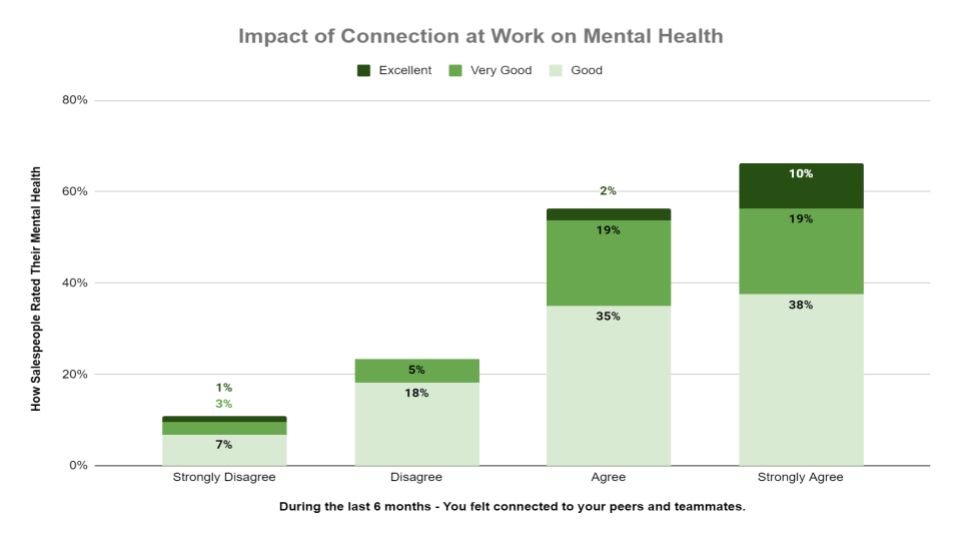
Impact of Connection on Sales Performance
Increased connection amongst salespeople also correlated positively with better sales performance. The most important take away from this section of the data is the role connection plays in achieving peak sales performance.
Sure – salespeople who feel strongly disconnected from their team will still perform to a certain degree. Among salespeople who “Strongly Disagreed” they felt connected to their peers and teammates; 54% rated their sales performance as Good or better, but only 8% rated their sales performance as Excellent.
This improves drastically when connection between salespeople increases. Among salespeople who “Strongly Agreed” they felt connected to their peers and teammates; 89% rated their sales performance as Good or better, with 31% rating their performance as Excellent!
Therefore, salespeople who felt a strong degree of connection to their peers were almost 4X more likely to describe themselves as achieving peak performance (Excellent); compared to sales teams that were operating as disconnected individuals or lone wolfs.
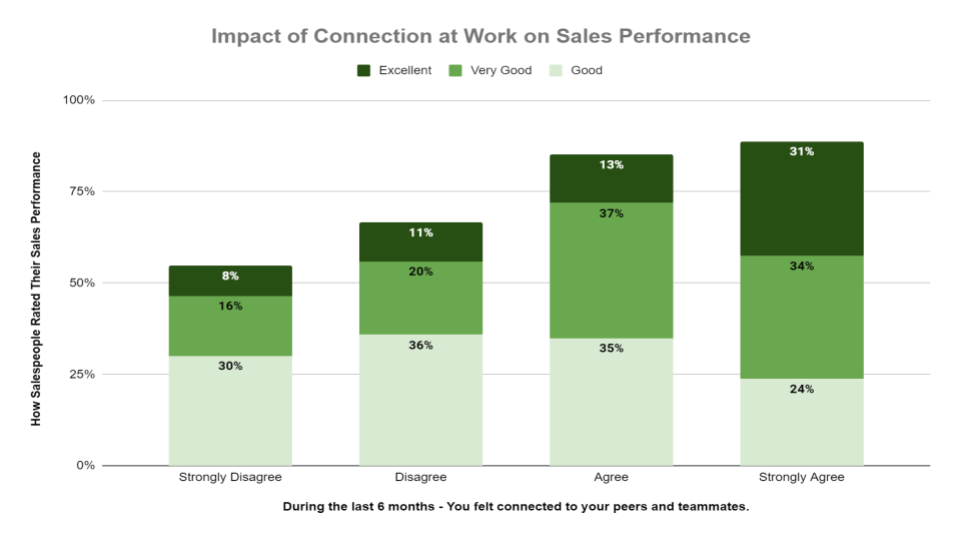
Connection Take Away
Comparable to the other variables we have already discussed, connection amongst sales reps impacts Mental Health and sales performance a lot.
Often these connections get built during team building activities, nights out together or through micro-interactions at the office. In an increasingly remote working environment, it has become more challenging for leaders to foster connection between teammates.
Though some of this connection will return as the ability to socialize with our peers becomes more common in a post COVID world; I do however believe it’s time for leaders to rethink how sales teams are structured and incentivized.
Individualism in sales is perpetuated by individual sales targets and individual incentive structures. As a result we are all incentivized to put our individual needs ahead of the needs of our team. Leaders then use these structures to create environments that pit salespeople against each other to “improve performance”.
Too often however, increased competition means sacrificing connection and the psychological safety of the team. It means sales reps only “feel safe” when they “win” first, with hardly any incentive to help others when they need it.
The data on Mental Health and sales performance is clear. As an industry we need to start prioritizing more connection over more competition if we wish to achieve peak performance. You can read more about how to achieve this in this post.
Next Steps & Psychological Safety Action Items
It should now be clear just how important supportive leadership, vulnerability, job security and connection are to sales performance and Mental Health. Improving psychological safety through these avenues should be the top priority for any sales leader building a high performing team.
In addition to environmental improvements, we as salespeople and leaders can also make individual improvements to their Mental Health. Tactics and strategies we can learn, that are rooted in neuroscience and physiology that will help us self-regulate stress.
It’s only when we’re able to take care of our own Mental Health first, when we’re able to be the most supportive, compassionate and empathetic to others on our team.
Building a psychological safe environment requires a team effort. The programming below will support you in acquiring this skillset. It will teach you new ways to improve your sales performance, resilience and EQ through better Mental Health.
Learn How to Thrive Under Pressure and Hit President’s Club
About The Author

Jeff Riseley is currently the Founder of the Sales Health Alliance and Mental Health Advocate. With over a decade of sales experience – Jeff understands the importance of Mental Health in achieving peak sales performance.
Jeff combines his sales and Mental Health expertise to improve sales performance through a mix of sales mentorship and mental health best practices. His strategies have helped sales teams improve their sales process, while helping them become more motivated, resilient and better equipped to tackle stressful events within sales.





5 Comments
Pingback: Dealing With Stress in Sales: 6-Point Guide - Sales Health Alliance
Pingback: The Dangers Of Going Back To The Office - Sales Health Alliance
Pingback: Why It's Hard To Speak Up In Sales - Sales Health Alliance
Pingback: Why Fear-Based Management Exists In Sales - Sales Health Alliance
Pingback: How to Help SDRs Handle Rejection | Vendition